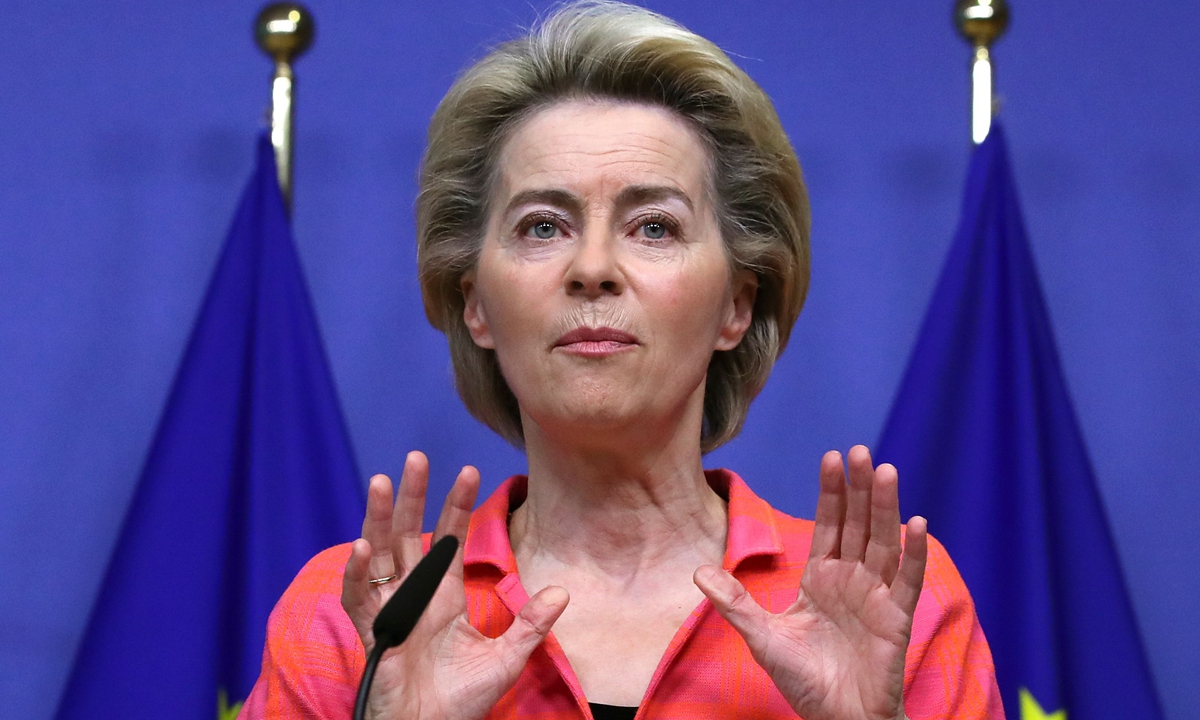
European Commission President Ursula von der Leyen Photo: VCG
European Commission President Ursula von der Leyen defended the EU’s trade deal with the US. By invoking Russia and China, she suggested that the failure to strike a deal would have been a gift to Europe’s rivals, according to media reports.
Chinese analysts have observed that von der Leyen’s remarks reveal a tendency among certain European politicians to politicize trade matters. Their emphasis on alliance with the US underscores Europe’s anxiety over American pressure, especially as Washington prioritizes its own interests and fails to treat Europe as an equal partner.
A trade war between the EU and the US would have been “celebrated” by Russia and China, von der Leyen wrote in a guest commentary for Germany’s Frankfurter Allgemeine Zeitung published on Sunday, per the Bloomberg report.
“Instead, we agreed on a strong, if not perfect deal,” she added, warning that retaliatory tariffs could fuel a costly trade conflict with “negative consequences for our workers, consumers, and our industry,” Bloomberg reported.
Similarly, von der Leyen wrote in an op-ed for Spain’s El Mundo on Saturday that “Imagine for a moment that the two largest democratic economies had not managed to reach an agreement and instead launched a trade war — only Moscow and Beijing would be celebrating,” the Politico reported.
Von der Leyen’s remarks came after the release of EU-US joint statement on Thursday, which confirmed that the EU will accept tariffs of 15 percent on 70 percent of its exports to the US, including cars, pharmaceuticals and semiconductors. In return, the bloc will expand market access for US agricultural goods that are not sensitive for its own market, according to media reports.
Although von der Leyen described the move as a choice for “stability and predictability over escalation and confrontation,” the controversial trade deal with US has drawn criticism. Former director-general Pascal Lamy have warned the accord risks undermining Europe’s credibility as a defender of rules-based trade, the Politico reported
Cui Hongjian, director and professor of the Center for European Union and Regional Development Studies at Beijing Foreign Studies University, told the Global Times on Monday that von der Leyen’s comments primarily serve to justify her compromises, as the US-EU trade agreement has substantially undermined European interests.
“Ironically, when the US imposes tariffs on Europe, it prioritizes its own interests, clearly not treating Europe as an equal partner,” Cui said, “Yet, Europe is willing to endure losses in its dealings with the US to maintain ongoing cooperation, in order to counter what it perceives as a greater ‘threat’ from non-Western economies, an approach blatantly politicizes trade matters.”
Cui said such actions reveal that some European politicians cling to an outdated worldview, unwilling to face the reality of the US gradually distancing itself from its traditional alliance with Europe. “Their emphasis on the alliance only underscores their anxiety over the losses and economic shocks inflicted by the US, not by China and Russia.”
The South China Morning Post said the Thursday deal did not explicitly mentioned China, however, “veiled references appeared throughout” in terms of AI chips, as EU pledged to purchase $40 billion of AI chips from the US, and that it would adopt US security standards to “avoid technology leakage to destinations of concern.”
According to Cui, China and the EU are scheduled to engage in high-level interactions in the latter half of the year, which requires fostering a constructive atmosphere, adding that China will judge Europe more by its actions than its words.
If Europe takes actions that harm China’s interests, China will undoubtedly respond with countermeasures. However, when EU politicians exploit criticism of China for political gain, it sows discord in China-EU relations and even risks creating conflict, which would in turn affects China’s relationships with individual member states. This is a situation China cannot accept as well, said the expert.